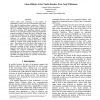Free Online Productivity Tools
i2Speak
i2Symbol
i2OCR
iTex2Img
iWeb2Print
iWeb2Shot
i2Type
iPdf2Split
iPdf2Merge
i2Bopomofo
i2Arabic
i2Style
i2Image
i2PDF
iLatex2Rtf
Sci2ools
122
click to vote
CORR
2002
Springer
2002
Springer
Robust Global Localization Using Clustered Particle Filtering
Global mobile robot localization is the problem of determining a robot's pose in an environment, using sensor data, when the starting position is unknown. A family of probabilistic algorithms known as Monte Carlo Localization (MCL) is currently among the most popular methods for solving this problem. MCL algorithms represent a robot's belief by a set of weighted samples, which approximate the posterior probability of where the robot is located by using a Bayesian formulation of the localization problem. This article presents an extension to the MCL algorithm, which addresses its problems when localizing in highly symmetrical environments; a situation where MCL is often unable to correctly track equally probable poses for the robot. The problem arises from the fact that sample sets in MCL often become impoverished, when samples are generated according to their posterior likelihood. Our approach incorporates the idea of clusters of samples and modifies the proposal distributio...
Related Content
| Added | 18 Dec 2010 |
| Updated | 18 Dec 2010 |
| Type | Journal |
| Year | 2002 |
| Where | CORR |
| Authors | Javier Nicolás Sánchez, Adam Milstein, Evan Tang Williamson |
Comments (0)

